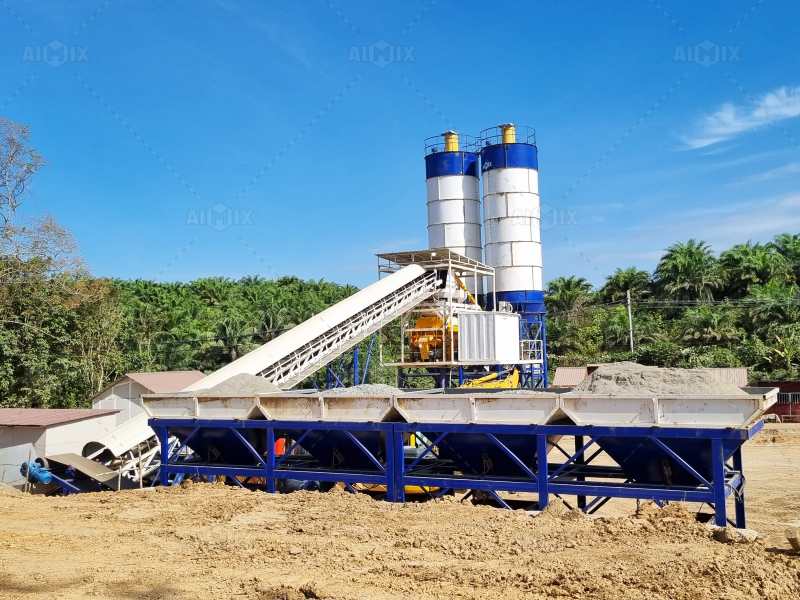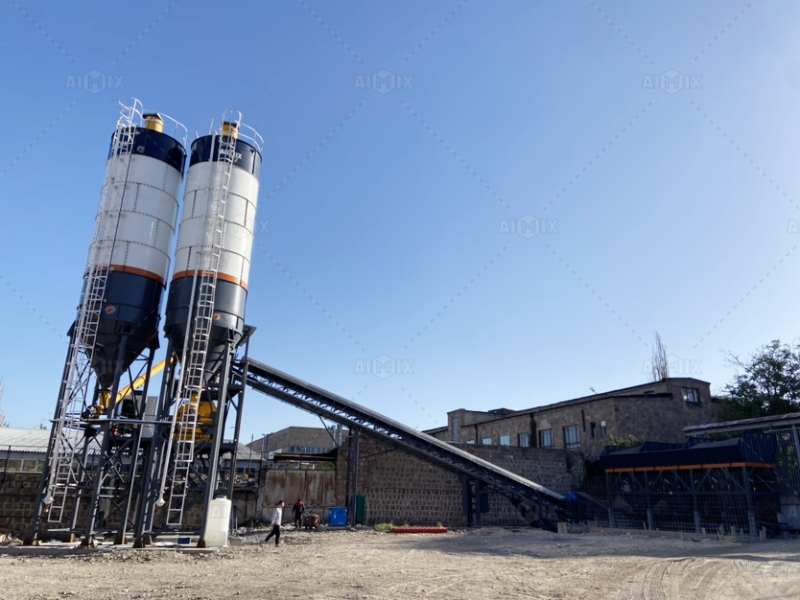5
0
0
2024 Concrete Batching Plant Price Comparison: Budget-Friendly to High-Capacity Models
4
zhengzhou,China
0
In the ever-growing construction industry, concrete batching plants play a pivotal role in ensuring that projects are completed efficiently and on time. Whether you are building a residential project, a large commercial complex, or a major infrastructure development, selecting the right concrete batching plant can have a significant impact on your project's budget, timeline, and overall quality. In this article, we will compare various concrete batching plants price list available in 2024, ranging from budget-friendly options for small-scale projects to high-capacity models designed for large-scale industrial applications.

Introduction to Concrete Batching Plants
Concrete batching plants are specialized equipment used to produce concrete by combining various ingredients, including cement, water, aggregates (sand, gravel, crushed stone), and additives. These plants are used in a wide range of construction activities, from road building and bridge construction to manufacturing precast concrete products.
The cost of a concrete batching plant can vary significantly depending on several factors such as capacity, features, automation, and whether the plant is mobile or stationary. In 2024, the market offers a variety of models with different price points, designed to cater to both small-scale and large-scale construction needs.
Budget-Friendly Concrete Batching Plant Models
For small to medium-sized projects, budget-friendly concrete batching plants provide an ideal solution. These plants typically have a lower output capacity, which suits applications such as residential construction, small roads, and sidewalks.
These budget-friendly models typically come with basic features like manual control systems, simple load cells, and minimal automation, but they are still reliable for smaller-scale projects where speed and precision are essential.
Mid-Range Concrete Batching Plant Models
For medium-sized projects or contractors looking for a balance of price and performance, mid-range concrete batching plants offer higher capacities and additional features compared to budget models. These plants are suited for larger residential projects, medium-sized commercial buildings, and smaller industrial works.
Mid-range models offer features like automated control panels, batch controllers, and better integration with external equipment such as mixers and trucks. They can be configured to produce different concrete grades, making them versatile for a range of applications.

High-Capacity Concrete Batching Plant Models
For large-scale commercial, industrial, and infrastructure projects, high-capacity concrete batching plants are necessary to meet the demands of mass concrete production. These plants have high output capacities, fast mixing times, and advanced control systems to handle continuous concrete production over long periods.
These high-capacity models also offer features like environmental control systems (dust and noise reduction), energy-saving designs, and higher levels of automation for streamlined production, quality control, and minimized human intervention.
Factors Affecting Concrete Batching Plant Prices
Several factors influence the price of concrete batching plants, regardless of the model:
Conclusion
In 2024, there is a wide range of concrete batching plants available, from budget-friendly models suitable for small-scale projects to high-capacity plants designed for large industrial operations. When choosing the right batching plant, it is important to balance your project's scale, required output, and budget. Smaller, mobile models can offer flexibility and efficiency for smaller jobs, while larger, stationary plants provide the capacity and automation needed for large-scale commercial and infrastructure developments. Understanding the features, costs, and capabilities of each model will help ensure that you select the right batching plant to meet your needs and deliver high-quality concrete efficiently.

Introduction to Concrete Batching Plants
Concrete batching plants are specialized equipment used to produce concrete by combining various ingredients, including cement, water, aggregates (sand, gravel, crushed stone), and additives. These plants are used in a wide range of construction activities, from road building and bridge construction to manufacturing precast concrete products.
The cost of a concrete batching plant can vary significantly depending on several factors such as capacity, features, automation, and whether the plant is mobile or stationary. In 2024, the market offers a variety of models with different price points, designed to cater to both small-scale and large-scale construction needs.
Budget-Friendly Concrete Batching Plant Models
For small to medium-sized projects, budget-friendly concrete batching plants provide an ideal solution. These plants typically have a lower output capacity, which suits applications such as residential construction, small roads, and sidewalks.
- Small Mobile Concrete Batching Plant (25-40m³/h) : The price of a small mobile batching plant ranges between $30,000 to $60,000 . These plants are compact, easy to transport, and require minimal setup time, making them a great option for construction projects that need flexibility and portability. The lower cost reflects the reduced capacity and less complex automation features, which still provide good performance for small-scale operations.
- Small Stationary Concrete Batching Plant (30-60m³/h) : A small stationary batching plant, with a slightly higher capacity, can range between $50,000 to $80,000 . These plants are more stable and ideal for projects with a fixed site, such as residential developments or small commercial buildings. They tend to have more robust mixing and weighing systems than mobile plants, offering better precision in batching.
These budget-friendly models typically come with basic features like manual control systems, simple load cells, and minimal automation, but they are still reliable for smaller-scale projects where speed and precision are essential.
Mid-Range Concrete Batching Plant Models
For medium-sized projects or contractors looking for a balance of price and performance, mid-range concrete batching plants offer higher capacities and additional features compared to budget models. These plants are suited for larger residential projects, medium-sized commercial buildings, and smaller industrial works.
- Semi-Automatic Stationary Batching Plant (60-100m³/h) : A semi-automatic stationary batching plant with a capacity of 60-100m³/h is typically priced between $80,000 and $150,000 . These models feature enhanced automation and more advanced control systems, allowing for better monitoring and management of the batching process. With the ability to batch larger quantities of concrete, they offer faster and more accurate production for projects with higher demands.
- Mobile Concrete Batching Plant (60-100m³/h) : Mobile batching plants in this category can cost between $90,000 and $170,000 , depending on the features and specific configuration. Mobile plants offer the flexibility to relocate easily and are suitable for projects that require frequent site changes. They are often used in road construction, large residential developments, or infrastructure projects that need a steady supply of concrete on the move.
Mid-range models offer features like automated control panels, batch controllers, and better integration with external equipment such as mixers and trucks. They can be configured to produce different concrete grades, making them versatile for a range of applications.

High-Capacity Concrete Batching Plant Models
For large-scale commercial, industrial, and infrastructure projects, high-capacity concrete batching plants are necessary to meet the demands of mass concrete production. These plants have high output capacities, fast mixing times, and advanced control systems to handle continuous concrete production over long periods.
- Large Stationary Concrete Batching Plant (120-200m³/h) : High-capacity stationary plants can range from $200,000 to $400,000 depending on the features and customizations. These plants are typically designed to handle large construction projects like highways, dams, bridges, and large commercial buildings. With automated systems, robust construction, and advanced mixing and batching technologies, they ensure efficient, high-quality concrete production.
- High-Capacity Mobile Concrete Batching Plant (120-200m³/h) : High-capacity mobile plants are priced between $250,000 to $450,000 . These plants are designed to be easily transported from site to site, and they come equipped with advanced technology, such as computerized control systems and automated data logging. Large mobile batching plants are ideal for projects that require substantial quantities of concrete and flexibility, such as large road or airport projects.
These high-capacity models also offer features like environmental control systems (dust and noise reduction), energy-saving designs, and higher levels of automation for streamlined production, quality control, and minimized human intervention.
Factors Affecting Concrete Batching Plant Prices
Several factors influence the price of concrete batching plants, regardless of the model:
- Capacity: As expected, the larger the capacity of the plant, the higher the cost. Higher-capacity models are designed to handle more material and operate at faster speeds, which increases their price.
- Automation: More advanced control systems, including automated mixing, monitoring, and batching features, increase the price. Fully automated plants allow for higher production rates and reduced human error.
- Customization: Custom features such as additional silos, extra mixer capacities, or specific design needs can raise the price.
- Location and Delivery: The location of the buyer can also impact the cost, as transportation fees for mobile batching plants or on-site installation costs for stationary models can be substantial.
Conclusion
In 2024, there is a wide range of concrete batching plants available, from budget-friendly models suitable for small-scale projects to high-capacity plants designed for large industrial operations. When choosing the right batching plant, it is important to balance your project's scale, required output, and budget. Smaller, mobile models can offer flexibility and efficiency for smaller jobs, while larger, stationary plants provide the capacity and automation needed for large-scale commercial and infrastructure developments. Understanding the features, costs, and capabilities of each model will help ensure that you select the right batching plant to meet your needs and deliver high-quality concrete efficiently.
Signatur